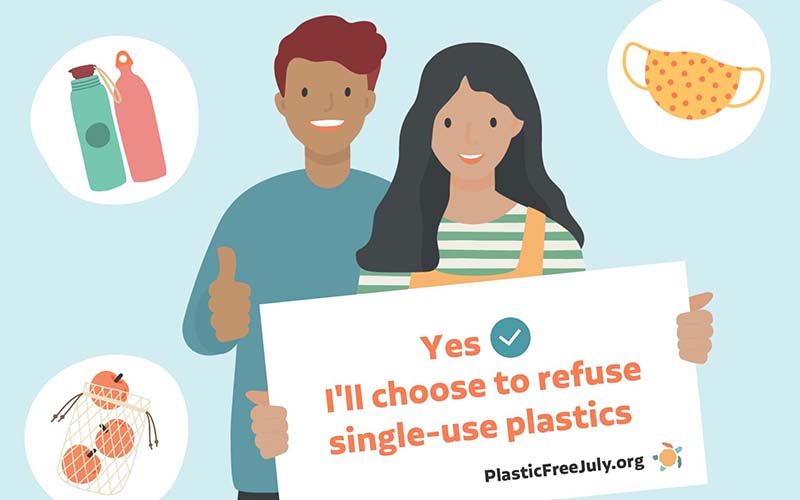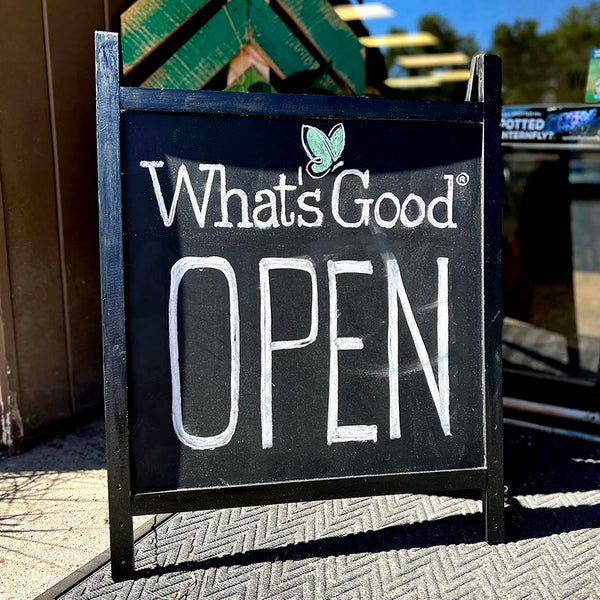FREE 🇺🇸 GROUND SHIPPING Orders 75+
FREE 🇺🇸 GROUND SHIPPING Orders 75+
Add description, images, menus and links to your mega menu
A column with no settings can be used as a spacer
Link to your collections, sales and even external links
Add up to five columns
Add description, images, menus and links to your mega menu
A column with no settings can be used as a spacer
Link to your collections, sales and even external links
Add up to five columns
Almost Plastic Free July?
July 02, 2021

We applaud the Plastic Free July initiative in bringing awareness and action to this important issue. It’s a great way to be more present with our plastic consumption.
That said, we want to say out loud that change is hard! Especially this change. Culturally, in the US anyway, plastic permeates everything in our lives. AND ITS USE IN & AROUND PRODUCTS IS GROWING, NOT DECREASING! So don’t beat yourself up, you won’t be perfect. But what you will do is become more aware in your daily life regarding plastic. Remember, it’s just like the idea of voting with our dollars: the more you refuse plastic products, the more we collectively amplify our voices to BOTH manufacturers and business owners that we don’t support the use of plastic in their products and packaging.
Here’s what What's Good is doing in support:
- Accepted the challenge: Refusing and Reducing plastic at work, in our products, and in our homes.
- Donating $1 for every order we receive in July to plasticfreejuly.org (read more about them below)
- Helping to spread the word about PlasticFreeJuly.org
- Helping to educate about the dangers of plastic on human health and the planet
What can you do?
- Join the Plastic Free July challenge, you can sign up here.
- Take the Pesky Plastic Quiz
- Educate yourself about plastic (see below to start)
- Refuse: Take a look at what you buy and try to find alternatives not wrapped in plastic. For example, buy produce in bulk at supermarkets or farm markets that offer naked produce. Be sure to bring your reusable produce bags or paper bags. Use bar soap over soap that comes in plastic bottles. Try laundry strips or powder for laundry detergent.
- Use Reusables: Try reusable water bottles and coffee cups; ditch baggies and cling wrap for plant based alternatives, silicone bags, organic cotton bags or wax wraps or stainless steel containers… and so much more.
- Spread the word on social media and with your friends. You don’t have to be preachy to help others reduce plastic, too.
Easy to sign up. Harder to execute.
Even for us. Yesterday was Day 1 of the challenge, and I’ve already messed up. I was wrapping up a lunch date with a friend when the waitress brought over two plastic to-go containers. Without thinking, I loaded up my leftover lunch, closed the container and then upon immediately realizing my mistake, I confessed it to my friend and the waitress. I didn’t want to waste my food (that’s a thing, too) but what to do? To my delight, the waitress shared that thanks to Covid, customers have been bringing in their own containers and suggested we start doing it, too. Yay! Another Covid positive.
And then again on Day 2… I ordered 15 bags of top soil to mix in before I reseed a bald patch with clover. As I opened the bags, I realized they were… bags. Uh oh. It didn’t occur to me until it was too late that I should have ordered bulk soil. Sure it would have required a wheel barrow and muscle. But isn’t that a small price to pay to avoid more plastic? Rest assured, I cleaned the bags as much as possible and put them in our grocery store recycling bin for soft plastics. Still. If not for plasticfreejuly.org, I may not have noticed.
As the founder of What’s Good, I’m sharing my fails to say, none of us is perfectly perfect, event this eco-store owner. There’s always work to do, always more to learn, and more ways to be greener. The important things is that we all get on board. We’ll get there… one green step at a time.
Now, let’s dig in a bit more. Why should we give up plastic?
- Plastic is made from fossil fuels.
- Fossil fuels aren’t renewable
- The extraction and refining of fossil fuels is toxic to our air and ecosystems surrounding the process.[9]
- And both processes are resource heavy… energy and water.
- Microplastics have been reported in food for human consumption [1].
- The average person could be eating up to 5 grams of plastic a week [2]
- Microplastics may also be inhaled and have been found in human organs and revealed in the placentas of unborn babies.[3]
- Toxic chemicals such as phthalates and BPA are present in the plastic many foods are packaged in.
- Microplastics entering the human body via direct exposures through ingestion or inhalation can lead to an array of health impacts, carcinogenic, developmental, or endocrine disrupting impacts, as well as inflammation, genotoxicity, oxidative stress, apoptosis, and necrosis, which are linked to an array of negative health outcomes including cancer, cardiovascular diseases, inflammatory bowel disease, diabetes, rheumatoid arthritis, chronic inflammation, auto-immune conditions, neuro-degenerative diseases, and stroke.[8]
- Every bit of plastic EVER manufactured still exists today. Plastic doesn’t degrade, it simply breaks down.
- 79% has accumulated in landfill or in the natural environment [1]
- 12% has been incinerated [1]
- 9% has been recycled [1]
- With only 9% of the world’s plastic being recycled, we can’t recycle away our problems. This doesn’t mean we shouldn’t recycle, we first need to refuse & reduce our plastic consumption.
- All plastics are harmful to land and sea creatures. Whether they’re ingesting it or becoming tangled in it.
- 8 million tons of plastic pollution enters our oceans each year[3]
- It’s estimated that by 2050, there will be more plastic in our oceans than fish [5]
- More than 270 marine species are affected by marine debris [6]
- In the next 30 years, 99% of seabirds will have ingested plastic [6]
It's a challenge in today’s landscape to be totally plastic free. That’s not to say we shouldn’t strive for and commit to not using plastic. We’re just saying, we know it’s hard to live in an all or nothing world. We want to remind you that any steps you take in this direction is good. There are tons of plastic alternatives. Don’t give up. You can be more plastic-free this month. Let us know how we can help.
xo Jennifer
P.S.
Be sure to download this science-based report:
Plastic & Health: The Hidden Costs of a Plastic Planet
P.S.S.
About PlasticFreeJuly.org
This year marks the 10th annual Plastic Free July. Behind it is The Plastic Free Foundation, a not-for-profit working hard to help millions of people become part of the solution to plastic pollution, so we can have healthier and cleaner streets, oceans, and communities.
P.S.S.S.
A few of our sources:
Human Consumption of Microplastics – Kieran D. Cox, Garth A. Covernton, Hailey L. Davies, John F. Dower, Francis Juanes and Sarah E. Dudas. American Chemical Society, 2019.
No Plastic in Nature: Assessing Plastic Ingestion from Nature to People – commissioned by WWF and carried out by University of Newcastle, 2019
Plasticenta: First evidence of microplastics in human placenta – Antonio Ragusa, Alessandro Svelato, Criselda Santacroce, Piera Catalano, Valentina Notarstefano, Oliana Carnevali, Fabrizio Papa, Mauro Ciro Antonio Rongioletti, Federico Baiocco, Simonetta Draghi, Elisabetta D’Amore, Denise Rinaldo Maria Matta, Elisabetta Giorgini. 2020
Production, use, and fate of all plastics ever made – Roland Geyer, Jenna R Jambeck and Kara Lavender Law. Science Advances, vol. 3, no. 7, 2017, e1700782, advances.
The New Plastics Economy: Rethinking the future of plastics, World Economic Forum and The Ellen MacArthur Foundation, Isle of Wight, UK: Ellen MacArthur Foundation, 2016.
The threat of plastic pollution to seabirds is global, pervasive and increasing – Chris Wilcox, Erik van Sebille and Britta Denise Hardesty, Proceedings of the National Academy of Sciences, August 2015, 112(38), pp.11899–11904
Economic incentives reduce plastic inputs to the ocean – Qamar Schuyler, Britta Denise Hardesty, TJ Lawson, Kimberley Opie, Chris Wilcox, ScienceDirect, 2018.
Plastic and Human Health: A Lifecycle Approach to Plastic Pollution — Center for International Environmental Law; https://www.ciel.org/plasticandhealth/
Leave a comment

Good News
If any email is worthy of your inbox, it's this. Our goal is 1–2x per month. You'll get helpful & inspiring eco info, plus subscriber-only discounts.
Welcome to What's Good
Here's your $10 coupon
COPY THIS CODE TO USE IN CHECKOUT
